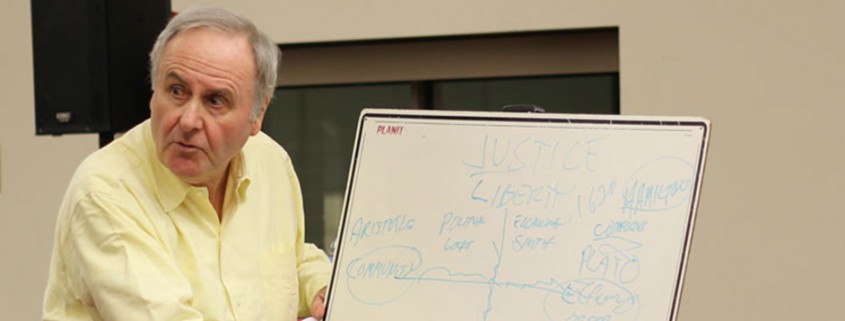Marshall professor speaks about values in democracy
Marshall School of Business professor James O’Toole, founding director of USC Jerry and Nancy Neely Leadership and Ethics Institute, spoke about the values system of a democracy and its implications on American politics at Mortar Board’s Last Lecture Series on Wednesday in the Ronald Tutor Campus Center.
O’Toole has been named one of the “100 most influential people in business ethics” by the editors of Ethisphere, and one of “the top 100 thought leaders on leadership” by Leadership Excellence magazine.
O’Toole started the lecture by saying that when he was young, he felt that he had a strong understanding of politics.
“I thought I understood what was going on in the world, particularly in regard to what was happening in government and politics,” O’Toole said.
He eventually realized, however, that he didn’t understand why people supported certain politicians.
“You try to make sense of who you like, and why you like the person,” O’Toole said. “There are all these debates. They seem very chaotic. No matter what you believe, how do you make sense of it?”
O’Toole went on to state that in a democracy, people make decisions based on their own personal values. He specifically sorted American values into four categories: liberty, equality, order and community.
“[Liberty] is a value that Americans in particular hold more dear than any other value,” O’Toole said. “Freedom or liberty. No one thought about liberty the way we think about it prior to 1620.”
He noted that this value conflicts with another American value — that of equality.
“If everyone is equal you are going to have chaos,” O’Toole said. “It was a long time before people began to value equality in society. However, if you want equality of outcome in society, this value of liberty is going to get in the way.”
He said that order is an important mediator between the two values.
“Any sensible person would trade off liberty and equality for a well-ordered society,” O’Toole said. “Order, to a lot of people, is the very highest value.”
But O’Toole also said that a sense of community was important for any democratic society to work.
“Aristotle said a just society is a society where every single individual can make a contribution to his or her society,” O’Toole said. “This notion of community then, really has to do with environmentalism and humanism.”
He then applied these values to politics, stating that most politicians derive their perspectives from these four core values.
“Almost every single politician today is reflecting one of these value sets. It is a shorthand for a broader idea of what they believe,” he said.
O’Toole said that these conflicting values can stall a country’s progress when applied to a political system.
“There are several problems,” O’Toole said. “Whose value is right? There are people with competing values who have made it almost impossible for society to move forward. Nobody is getting what they want.”
O’Toole ended the lecture by reminding the audience that backing a candidate doesn’t necessarily mean that the candidate will uphold the values of the people who voted for them.
“The problem is that democracy doesn’t guarantee anything,” O’Toole said. “All it guarantees is that you have a voice, nothing more than that.”
Allison Bajet, a senior majoring in print and digital journalism, said that the lecture really helped her think critically about the values that America has based itself on.
“I felt it was very informative. I never really thought about the values of our society,” she said. “It was very interesting for me. I really liked how he laid out the four pillars that our presidents used to create a just society.”

